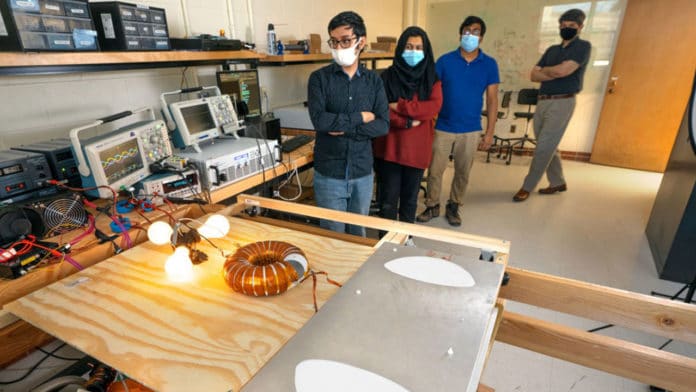Imagine charging your electric car by simply changing lanes and driving over special charging strips embedded in the road.
A team of researchers from Cornell University, led by associate professor Khurram Afridi, is working on an innovative approach for the wireless charging of electric vehicles, autonomous forklifts, and other mobile machines while they remain in motion. The technology would save time for drivers and improve productivity in warehouses.
The concept presented by Afridi’s team is not based on direct contact between the car’s chassis and the ground, as in the case with, for example, wireless chargers that are designed for smartphones because they use magnets. In this design, the magnet has been replaced with two insulated metal plates on the ground. These are connected to a power line through a matching network and a high-frequency inverter.
The plates create oscillating electric fields that attract and repel charges in a pair of matching metal plates attached to the underside of a moving vehicle. This drives a high-frequency current through a circuit on the vehicle, which rectifies it. The rectified current then charges the battery.
The main challenge is that electric fields generated by readily available voltages are quite weak. Afridi and his team compensated by boosting the voltage and operating the system at very high frequencies to achieve large levels of power transfer.
The new ferrite-free system promises to be smaller, lighter, less expensive, and easier to embed in the roadway, making it a more viable option than the magnetic field concept.
The concept proposed by Khurram Afridi is not easy to implement; it requires a large amount of knowledge, qualified scientists, and a large budget. However, the professor’s team is already working on the first prototype to be installed in both an electric vehicle and the road itself. Earlier this year, Afridi’s project received $1.425 million to continue its research and development. The project has the potential to drastically reduce the need for expensive and bulky onboard batteries, enable unlimited range and accelerate EV market penetration.
It goes without saying that the vision of not having to stop at charging stations and avoiding long breaks or re-routing to replenish the car’s batteries is extremely interesting. However, fine-tuning the right technology will take years to come.
In similar efforts, ElectReon is developing a wireless EV charging road system that will charge electric vehicles as they travel on it.
